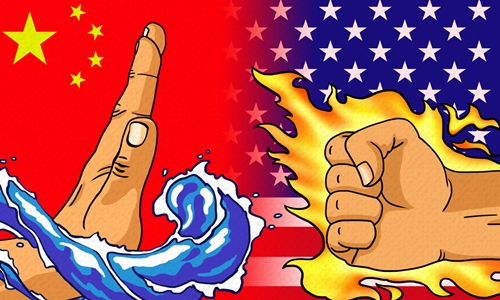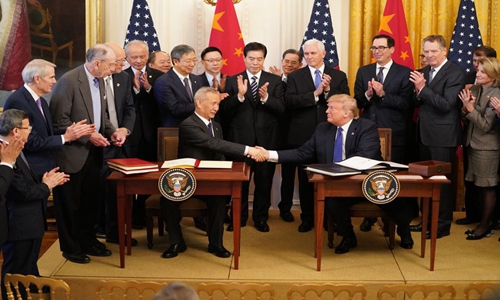Can trade ties help avert a China-US war?
Intertwined biz interests still a stabilizer in China-US relations

China VS US
Many international relations experts have painted a rather dark picture for the China-US bilateral relationship. In their view, a war might be inevitable given the US' seemingly all-out campaign against China over the fallout regarding the COVID-19 pandemic. But in China, a more optimistic and firm belief among former officials and top experts still persist that the highly intertwined economic interests of the two countries will help prevent a hot war.
In interviews with the Global Times, these former officials and experts, who play a major role in China forming its foreign and trade policies, argue that the China-US economic and trade relationship is that massive, intricate and complex that no single US administration, let alone individual officials, can untangle it so easily as they are attempting to and that it remains intact as a stabilizer for the world's most consequential relationship at such a delicate conjuncture.
Still, in light of relentless hostility from Washington, there is also a sobering realization among many in China that bilateral relationship with the US has reached a point of no return from which rivalry and confrontation will overtake constructive engagement as the US' desperation to cling onto its remaining global strength and influence will only intensify with the rapid rise of China. This realization is also expeditiously transforming into a clear approach in China toward the US: going toe-to-toe with it, including in economic and trade realms, experts said.
US 'clown act'
This optimistic view particularly stands out at a time when some warmongering politicians in the US are constantly stepping up attempts for a China-US economic "decoupling," challenging the very foundation that many on both sides believe has kept the bilateral relationship between the two vastly different countries on relatively stable terms for decades.
The latest attempt from Washington was an order from President Donald Trump earlier this week for the main US federal government pension fund to "immediately halt" a plan to invest in a global stock portfolio that include Chinese companies, citing national security risks. In explaining the order, US officials claimed that there could be "sanctions" from China's "culpable actions" over COVID-19.
In a separate move on Tuesday, US Republican Senator Ted Cruz has proposed legislation that offers massive subsidies for the US' rare earths sector, which is critical for the manufacturing of high-tech and military equipment, in a bid to cut the US' reliance on imports from China. Cruz, one of the China hawks in the US, said China is the greatest geopolitical threat the US faces over the next century.
While recognizing that the latest moves represent a further escalation in Washington's campaign for an economic decoupling from China that would push the two countries toward a deeper confrontation, some analysts dismiss such moves as "clown acts" of these US politicians for political expedience and carry no real teeth in regards to cracking down on China but will only result in massive losses for US investors and businesses.
"I think at this point, China is looking at these actions like watching a clown performing," Guan Tao, a former official at the State Administration of Foreign Exchange, told the Global Times, noting that such an act, while appealing to some ignorant quarters of the US, will not pull profit-driven US investors and businesses away from the lucrative Chinese market and subsequent assets.
Guan said that US investors will likely ignore the order and find a different channel via a market in a third-country to invest in the same portfolio, and if they follow the order, it means they will miss out on a rare opportunity at a time when assets in other major economies, including the US, are less attractive due to negative interests.
Confirming Guan's view, the Federal Retirement Thrift Investment Board (FRTIB), which oversees the pension fund, had rejected a similar request from US lawmakers in November 2019 to drop investment in the MSCI index that includes Chinese companies. Also, MSCI Inc said on Wednesday that it has added over 110 Chinese companies to various indexes compared to more than 70 deletions.
Such decisions by the FRTIB and the MSCI are at the core of the argument from these former officials and trade experts that economic interests will ultimately outweigh any ideological prejudice and election politics.
However, coupled with a flurry of other actions the US government has taken to crack down on China in areas such as trade and technology, the latest moves from Washington also add to the question of solidity in economic and trade ties - the stabilizer for the broader bilateral relationship: Will it hold? How will it evolve?

US President Donald Trump and Chinese Vice Premier Liu He, who is also a member of the Political Bureau of the Communist Party of China Central Committee and chief of the Chinese side of the China-U.S. comprehensive economic dialogue, shake hands after signing the China-U.S. phase-one economic and trade agreement during a ceremony at the East Room of the White House in Washington D.C., the United States, Jan. 15, 2020. (Xinhua/Wang Ying)
Stabilizer intact
"Although the China-US relationship is undergoing some profound changes, the fact that the massive bilateral economic and trade relationship is a stabilizer has not changed and will continue to play a major role in underpinning the bilateral relationship in difficult times," Mei Xinyu, a research fellow at the Chinese Academy of International Trade and Economic Cooperation under the Ministry of Commerce, told the Global Times.
So far, economic interests appear on the winning side in comparison to ideological and political differences.
Despite the decoupling attempt from US officials, including a tariff war, US foreign direct investment in China increased to $14 billion in 2019, as US companies continued to bet on the Chinese consumer market and opportunities stemming from China's opening-up measures, according to a report released by the US-based firm Rhodium Group on Monday.
However, that does not mean the dynamics of bilateral economic ties will not change. Even before COVID-19 began, China mounted a fierce defense against the trade war resulting in a phase one trade agreement, under which China agreed to increase imports of US products, while the US pledged to reduce tariffs in phases.
Washington's band-aid approach from the beginning of COVID-19 has only consolidated China's strategy of going toe-to-toe with the US to win ultimately respect and peace, former officials and experts said.
"We should adopt a calm attitude in analyzing these US calculations, even if they turn into actions," Guan said, noting that China is strong enough to deal with US aggression. "We will counter whatever comes our way with the appropriate tools."
In another sign of such a tough approach, Chinese experts harshly criticized Trump's recent threat of terminating the trade deal, and called for an even more aggressive approach in dealing with the US over trade at a time when the latter is at disadvantage due to COVID-19.
Trump, following criticism from China over his threats, said on Tuesday that he would push forward the deal. In Beijing, officials also said that the deal is good for China, the US and the world and should be implemented.
Commenting on the US' move to ban investment in Chinese stocks, Zhao Lijian, a spokesperson for the Chinese Foreign Ministry, also said on Wednesday that economic cooperation between China and the US are mutually beneficial and politicizing normal investment activities will only hurt US investors' interests.

